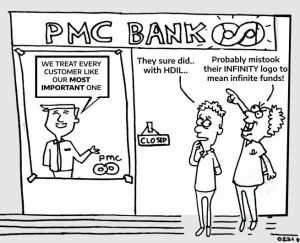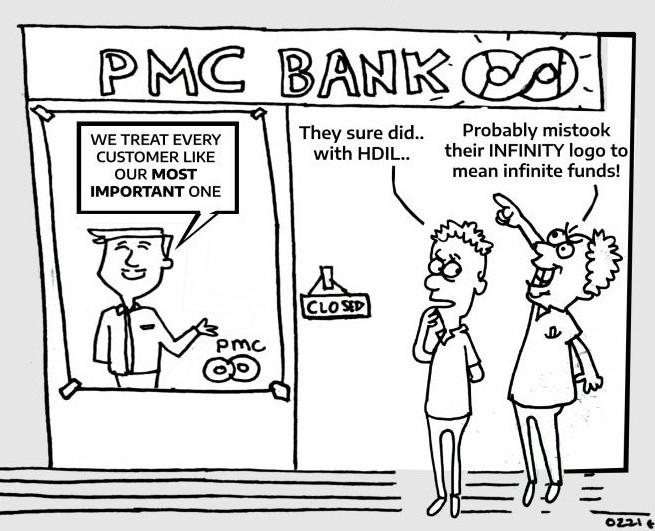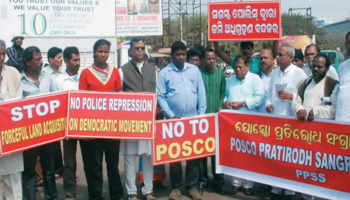On 23 September 2019, the Reserve Bank of India (RBI) issued a directive to Punjab and Maharashtra Cooperative Bank (PMC) restricting withdrawals of all depositors to only Rs. 1,000 each for a period of 6 months. No reasons were stated nor any explanation offered in the RBI press release issued the next day. Over 3 lakh depositors, spread over 6 states were shocked by this development. The latest audited financials of PMC showed the bank to be in good health and the PMC was reputed to be one of the top 5 cooperative banks in the country.
News reports over the next few days revealed that a massive scam where over 73% of PMC’s loans were to a single Mumbai based real-estate company named Housing Development and Infrastructure Limited (HDIL). The Bank of India had initiated insolvency proceedings against HDIL in early August 2019 for the recovery of a debt of around Rs. 520 crore. HDIL owed PMC a loan of Rs. 6,500 crores. This loan had gone bad over two years ago and was over 4 times the amount that the bank could lend to a single borrower.
 Simultaneously, news emerged that the scam was not just an ordinary case of a loan going bad. The PMC managing director, Joy Thomas, in a letter to the RBI admitted that he and some board members knowingly spread the HDIL loan over 21,049 fake accounts so that it would not attract attention of the auditors, regulators and other board members. Waryam Singh was a director at HDIL before he joined as the PMC bank Chairman. HDIL promoter Rakesh Wadhawan and Singh had even started a firm that breeds racehorses together! The nexus between the bank and borrower is clearly evident.
Simultaneously, news emerged that the scam was not just an ordinary case of a loan going bad. The PMC managing director, Joy Thomas, in a letter to the RBI admitted that he and some board members knowingly spread the HDIL loan over 21,049 fake accounts so that it would not attract attention of the auditors, regulators and other board members. Waryam Singh was a director at HDIL before he joined as the PMC bank Chairman. HDIL promoter Rakesh Wadhawan and Singh had even started a firm that breeds racehorses together! The nexus between the bank and borrower is clearly evident.
These revelations enraged depositors who feared the loss of their savings. The average size of deposits at the PMC Bank was roughly Rs. 10,000, which indicates that the majority of the bank’s depositor base was from among working people. On the other hand, the owners of HDIL, Rakesh and his son Sarang Wadhawan, owns assets worth 3,500 crore which includes a 5 acre property worth Rs. 70 crore in the Mumbai suburbs, over Rs. 60 crore worth of jewellery, 12 expensive cars worth a few crores each, along with two nine-seater personal aircrafts and a speed-boat. HDIL was also one of the sponsors of the IPL team, Kolkata Knight Riders. A yacht worth around Rs 200 crore belonging to Wadhawans was found anchored in the Maldives. The ED will be writing to Maldivian authorities to seize and bring the yacht to India. Meanwhile, properties of Wadhawans in Gulf countries and the United Kingdom are being traced. Once found, they will also be attached after the due procedure.
As days went on, irate depositors protested and forced the RBI to relax restrictions. Rs. 1,000 was first increased to Rs. 10,000 and then to Rs. 25,000. The RBI even declared that with withdrawal limits at Rs. 25,000, over 70% of depositors could withdraw their entire savings.
The PMC-HDIL scam points to two greater problems:
The first concerns the regulation of banking and financial institutions. All these institutions are regulated by the RBI which is clearly failing in its task. Cooperative banks also face some scrutiny from the Registrar of Cooperatives of the appropriate state. In Maharashtra alone around 165 cooperative banks that have failed in the last 30 years. Partly to blame for this is also the large degree of influence local politicians and political parties have in the running of cooperative banks.
The second is the dreadful state of the construction and real estate sector. Construction is the single largest employer in the country after agriculture and the general slowdown of the economy has greatly impacted construction activity. Over 13 lakh houses worth Rs. 9.38 lakh crore are unsold across India. This amounts to around 5% of country’s gross domestic product and is more than the gross state domestic products of most states including Kerala, Haryana, Madhya Pradesh, Andhra Pradesh, and is almost double that of Bihar. Mumbai alone, which was HDIL’s sole area of operation has 3.7 lakh unsold housing units.
This not to say that HDIL going bankrupt is only due to a slowdown in construction and real estate sector or the general economy as a whole. Or to imply that this slowdown caused PMC to lend a single company 73% of its loans, hide that amount across 20,000 fake accounts or place a former HDIL person as its chairman.


